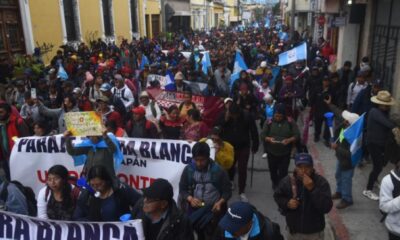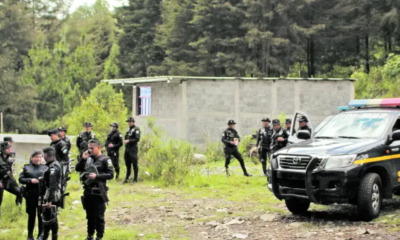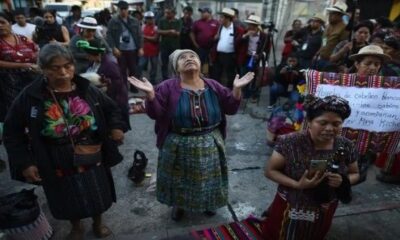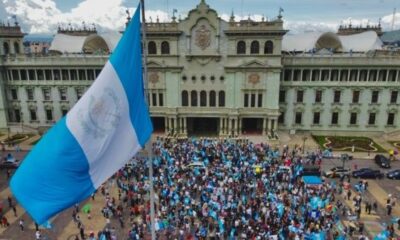Central America
Guatemala’s anti-corruption commissioner, Santiago Palomo, says that the State is in a “critical” condition
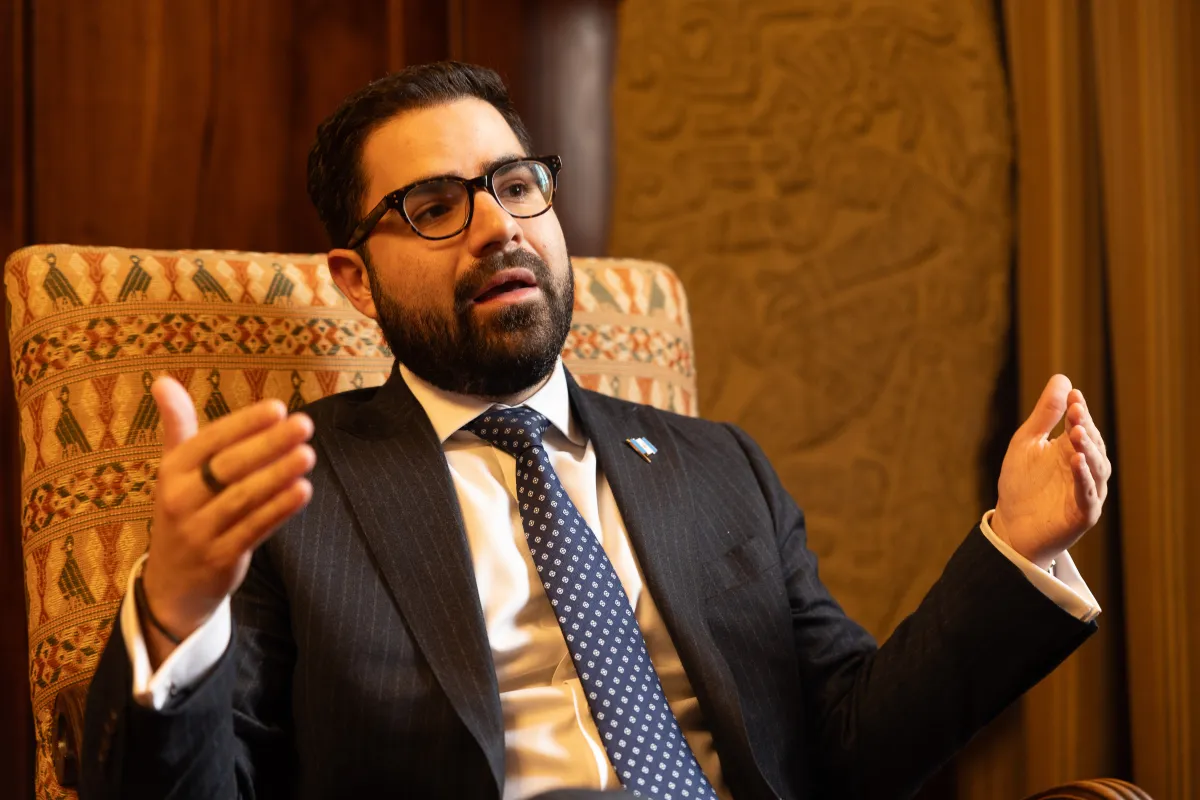
The anti-corruption commissioner of the Government of Guatemala, Santiago Palomo, assures that the first months in office have been “a roller coaster” after having found a State “in critical conditions” in the face of the indications that between 2 billion and 3 billion dollars were embezzled during the presidency of Alejandro Giammattei (2020-2024).
Palomo, a 29-year-old lawyer graduated from Harvard University (USA), said during an interview with EFE that his first months in the position, appointed by the president, Bernardo Arévalo de León, have been “intense” and comparable to “a roller coaster.”
“We are trying to navigate in an Executive body that we receive in critical conditions. We identify a pattern when chatting with the new ministers and secretaries: they describe it as a dead rat in each drawer that is opened. This is how the conditions in which the Government was assumed are defined,” Palomo explains.
According to experts cited by local and international media, the Government of Giammattei could have embezzled up to 3 billion dollars between 2020 and 2024.
Precisely the Corruption Perception Index of 2023 placed Guatemala in 2023 among the five countries with the most embezzlement of state funds. Only behind Haiti, Nicaragua, Venezuela and Honduras.
Commissioner Palomo says that the corruption found operated under the same pattern. “Relevant financial disbursements from 70% to 90%” for the construction of “public works that are being thrown away, such as schools and roads, whose progress does not exceed 30% or 40%.”
According to the official, “this is how these corruption structures worked in the State, right now they are still trying to operate,” the official remarked.
The Government of Arévalo de León denounced Amelia Flores, former Minister of Health of Giammattei, before the courts of justice on April 4, for anomalies in the purchase of 16 million doses of the Russian Sputnik vaccine, in 2021 for a total amount of 615 million quetzals (79 million dollars).
According to various sources, many of the vaccines never reached the Central American country and others expired before their application.
“The case of vaccines shows that they were willing to pursue their own interests to the detriment of the most sacred thing, which was the health of the population, in the midst of a pandemic. It is a case that reflects how unscrupulous the degree of corruption of the previous Administration became,” says Palomo.
Last week Palomo, along with the Minister of Communications, Jazmín de la Vega, denounced two former officials for a possible fraud in the assignment of contracts to a company for the construction of 14 schools for an amount between 45 and 60 million quetzals (between five and seven million dollars approximately).
The anti-corruption tsar explains that it is up to the Executive Body to detect and prevent cases of corruption from occurring in its Administration. But that is the Public Ministry (Attorney’s Office) that “is responsible for investigating and prosecuting.”
“The Prosecutor’s Office does not have a real commitment to investigate serious cases of corruption,” it is not an ally in the fight against corruption,” which becomes a real challenge, Palomo recognizes, although, he said, the Administration of Arévalo does not intend to stop denouncing the anomalies that are found in the various ministries.
In 2023, the Prosecutor’s Office, led by Consuelo Porras Argueta, tried to stop the electoral victory of Arévalo de León in the general elections through various criminal cases and dozens of governments around the world sanctioned his action, including that of the United States and members of the European Union.
Arévalo de León surprisingly prevailed over the traditional politics of Guatemala thanks to his offer to heal the corruption of the State that has caused a significant democratic deterioration in the last 30 years.
Palomo concludes that assuming the anti-corruption arm of this Government for the next four years is “a great responsibility.” An “opportunity to improve the dignity of the public service.”
Central America
Washington Imposes Visa Ban on La Modelo Director Amid Crackdown in Nicaragua

The United States government announced Wednesday that it has imposed visa restrictions on Roberto Clemente Guevara Gómez, director of Nicaragua’s largest prison, La Modelo, for his involvement in actions that violate human rights.
In a statement, U.S. Secretary of State Marco Rubio said the measure is intended to promote accountability for abuses committed under what he described as the “Murillo-Ortega dictatorship” against political prisoners.
Rubio specified that Guevara Gómez was designated for participating in “a gross violation of the human rights of a political prisoner.” The sanction was issued under the 2024 Department of State, Foreign Operations, and Related Programs Appropriations Act, which bars the sanctioned individual — and potentially immediate family members — from entering the United States.
“United States demands the immediate and unconditional release of all political prisoners unjustly detained in Nicaragua,” the statement added.
Ongoing tensions between Washington and Managua
Washington rejected Nicaragua’s November 2021 elections, in which President Daniel Ortega and his wife, now co-president Rosario Murillo, were reelected while seven potential challengers were in prison.
Relations between the two countries remain tense amid expanding U.S. sanctions and increasing diplomatic pressure on the Nicaraguan government.
On January 10, marking Ortega’s 19 years in power, Nicaragua released “dozens of detainees,” including political prisoners. The move came one day after the U.S. Embassy in Managua stated that “more than 60 people” remain “unjustly detained or disappeared” in the Central American nation.
U.S. officials have continued to push for the “unconditional release” of political prisoners rather than selective or temporary releases.
Ortega, 80, governs alongside Murillo with consolidated authority, having strengthened executive power through constitutional reforms and security measures, while the opposition has been weakened by imprisonment, exile, and the revocation of citizenship and property rights.
Central America
Guatemala’s Attorney General Consuelo Porras Loses Bid for Constitutional Court Seat

Guatemala’s attorney general, Consuelo Porras, who has been sanctioned by the United States over corruption allegations, lost a key vote on Monday in which a public university selected two of the 10 magistrates for the country’s highest constitutional court. However, she could still seek a seat through another nominating body.
The election of five full magistrates and five alternates to the Corte de Constitucionalidad (CC) is taking place gradually over more than two months and is considered crucial in the ongoing struggle for control of Guatemala’s judiciary, which critics say has long been influenced by a political and economic elite accused of corruption.
According to results announced at a press conference, the governing council of the Universidad de San Carlos de Guatemala (USAC) rejected Porras, who had applied as either a full or alternate magistrate, and instead chose two candidates aligned with the university rector. The vote was held at a hotel in Antigua, about 35 kilometers from the capital.
Despite the setback, Porras — whose term as attorney general ends on May 16 — could still be nominated to the Constitutional Court by the Corte Suprema de Justicia, which appoints two magistrates. The remaining six are selected by the president, the bar association and Congress.
“It’s always a possibility,” the 72-year-old lawyer said days earlier when asked by reporters whether she would seek nomination through another institution if she lost the USAC vote.
Porras has been sanctioned by Washington and the European Union for allegedly attempting two years ago to block the inauguration of President Bernardo Arévalo and for pursuing legal actions against anti-corruption prosecutors, judges, journalists and social leaders since taking office in 2018.
The USAC vote was controversial because most members of the university’s governing council are serving beyond the expiration of their terms. Students, academics and social activists staged protests against Porras’ candidacy.
Central America
Teens visit ETESAL substation to learn about responsible energy use

Within the framework of World Energy Day, teenagers from the institutional care center Ciudad Niñez y Adolescencia (CNA), run by the Consejo Nacional de la Primera Infancia, Niñez y Adolescencia (Conapina), took part in an educational visit to a substation operated by Empresa Transmisora de El Salvador (ETESAL) in Santa Ana.
The aim of the activity was to give participants first-hand knowledge of how the country’s electricity transmission system works and to highlight the importance of responsible energy use.
During the tour, the group learned about the process that delivers electricity to homes, businesses, and industries. They were also introduced to specialized technical equipment and the safety measures required to ensure an efficient and reliable service.
Before the guided visit, the teenagers attended two informative talks and an environmental awareness session focused on the relevance of responsible energy consumption and its impact on the environment.
According to Nelson Menjívar, head of Conapina’s programs unit, the initiative serves a dual purpose. “It has two objectives: a recreational component and an educational one, so that adolescents can learn about the work carried out by ETESAL and how some of the resources they use at home are generated. This is in keeping with the guarantees established under the Crecer Juntos law; we ensure those rights for children,” he said.
Menjívar stressed that these activities help young people better understand how essential services function in their daily lives while promoting efficient consumption habits and a culture of environmental respect and care.
The event is part of the principle of shared responsibility set out in the Crecer Juntos law, promoted by the administration of Nayib Bukele, which states that families, society, private companies, and the State must work together to safeguard the comprehensive well-being of children and adolescents.
-

 International4 days ago
International4 days agoFamily of “El Mencho” Seeks Return of Body After Deadly Military Operation
-

 International4 days ago
International4 days agoLarry Summers Steps Down from Harvard Role Amid Epstein Controversy
-

 International4 days ago
International4 days agoIran’s President Optimistic Ahead of Geneva Nuclear Talks with U.S.
-

 International4 days ago
International4 days agoBill Gates Admits “Serious Mistake” Over Epstein Ties
-

 International4 days ago
International4 days agoStephen Hawking Photo Appears in Newly Released Epstein Documents
-

 International3 days ago
International3 days agoCocaine Production Surges 34% in 2023 as Market Expands into Africa and Asia
-

 International3 days ago
International3 days agoFederal Judge Blocks Trump Policy Allowing Deportations to Third Countries
-

 International2 days ago
International2 days agoTrump Floats “Friendly Takeover” of Cuba Amid Rising Tensions
-

 International3 days ago
International3 days agoClinton Accuses Republican Committee of Using Epstein Case to Shield Trump
-

 International2 days ago
International2 days agoArgentina’s Senate Reviews Milei-Backed Labor Overhaul
-

 International22 hours ago
International22 hours agoSecurity Council to Hold Emergency Meeting on Middle East Crisis
-

 Sin categoría22 hours ago
Sin categoría22 hours agoTrump: ‘We Think It’s True’ Amid Claims Iran’s Supreme Leader Was Killed
-

 International3 hours ago
International3 hours agoIran Reports 201 Dead, 747 Injured After U.S. and Israeli Strikes
-

 International3 hours ago
International3 hours agoPope Leo XIV Urges End to ‘Spiral of Violence’ in Middle East

















































































